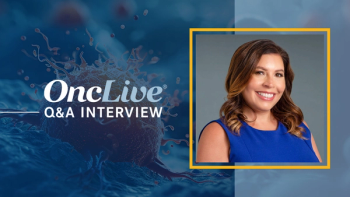
FDA Grants Orphan Drug, Fast Track Designations to CV-01 in Recurrent Glioblastoma

CV-01, Alpheus Medical’s novel sonodynamic therapy delivery platform, has received orphan drug and fast track designations from the FDA for the treatment of patients with recurrent glioblastoma.
CV-01, Alpheus Medical’s novel sonodynamic therapy (SDT) delivery platform, has received orphan drug and fast track designations from the FDA for the treatment of patients with recurrent glioblastoma (GBM), according to a news release from Alpheus.1
SDT offers the possibility of non-invasively eradicating solid tumors in a site-directed manner through the sensitization of target tissues with a non-toxic sensitizing chemical agent and subsequent exposure of the sensitized tissues to relatively low-intensity ultrasound.2
“The FDA fast track and orphan drug designations are significant milestones and highlight the importance of innovation within the field of brain cancer,” Vijay Agarwal, MD, chief executive officer and found of Alpheus Medical, stated in a press release. “Built on a very successful preclinical program, we believe our proprietary SDT platform is a game changer and has the potential to significantly advance the treatment of gliomas.”
GBM is the most common malignant primary brain tumor, accounting for approximately 57% of all gliomas and 48% of all primary malignant central nervous system (CNS) tumors.3 Prognosis is poor, with a median survival of less than 2 years, and long-term survival is rare. However, molecular features such as IDH-1 and IDH-2 mutations and MGMT methylation are associated with better outcomes.4
The 1-year relative overall survival (OS) was 41.4% for patients diagnosed in the United States between 2000 and 2014, improving to 44.6% for 2005 to 2014. Despite recent treatment advances, median OS remains just 12-18 months, and the 5-year relative survival is 6.1% (95% CI, 6.0%-6.3%).5,6
An ongoing, first-in-human phase 1 trial (NCT05362409) is evaluating CV-01 delivery of ultrasound for SDT in combination with 5-aminolevulinic acid (5-ALA) for patients with recurrent high-grade glioma. Investigators plan to administer 5-ALA as a sonosensitizer prior to using the CV-01 to deliver nonablative, low-intensity ultrasound to deep regions of the brain to induce apoptosis of cancer cells to 33 patients.7
The primary end points are safety, tolerability, and maximum tolerable duration. The estimated primary completion date is February 2023.
“The diffuse nature of GBM, often across the hemisphere, makes it an extremely challenging disease to treat. There are very few effective options, leading to poor patient outcomes, and a universally fatal disease," Michael Schulder, MD, director of the Brain Tumor Center and primary investigator for the clinical trial at Northwell Health’s Institute for Neurology and Neurosurgery, stated in a press release. “Alpheus’ SDT enables noninvasive, diffuse treatment across the hemisphere. It has the potential to change the landscape of high-grade glioma therapy and we are excited to be part of this important study.”
The FDA’s orphan drug and fast track programs are streamline the development process for new therapies and accelerate treatment delivery to patients with serious and rare conditions. Orphan drug status is reserved for investigational therapies for diseases or conditions affecting fewer than 200,000 people in the United States. The fast track designation facilitates communication between the FDA and the product sponsor throughout the development and review process.
References
- FDA grants Alpheus Medical orphan drug and fast track designations for novel sonodynamic therapy for brain cancer. Alpheus Medical Inc. News release. July 13, 2022. Accessed July 13, 2022.
https://prn.to/3IBiDFB - McHale AP, Callan JF, Nomikou N, Fowley C, Callan B. Sonodynamic herapy: Concept, mechanism, and application to cancer treatment. Adv Exp Med Biol. 2016;880:429-50. doi:10.1007/978-3-319-22536-4_22
- Ostrom QT, Gittleman H, Truitt G, et al. CBTRUS statistical report: primary brain and other central nervous system tumors diagnosed in the United States in 2011-2015. Neuro Oncol. 2018;20(suppl_4):iv1-iv86. doi: 10.1093/neuonc/noy131
- Tan AC, Ashley DM, López GY, et al. Management of glioblastoma: state of the art and future directions. CA Cancer J Clin. 2020;70(4):299-312. doi: 10.3322/caac.21613.
- Birzu C, French P, Caccese M, et al. Recurrent glioblastoma: from molecular landscape to new treatment perspectives. Cancers (Basel). 2020;13(1):47. doi: 10.3390/cancers13010047
- Ostrom QT, Truitt G, Gittleman H, Brat DJ, Kruchko C, Wilson R, Barnholtz-Sloan JS. Relative survival after diagnosis with a primary brain or other central nervous system tumor in the National Program of Cancer Registries, 2004 to 2014. Neurooncol Pract. 2020;7(3):306-312. doi: 10.1093/nop/npz059
- Study to evaluate 5-ALA combined with CV01 delivery of ultrasound in recurrent high grade glioma. Accessed July 13, 2022. https://bit.ly/3Rtc4Zz


































